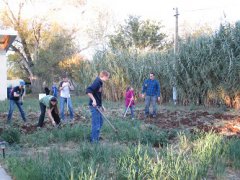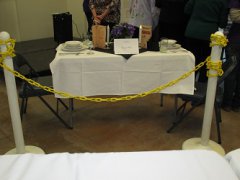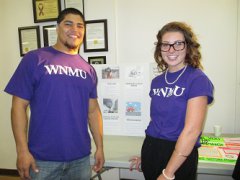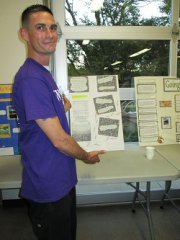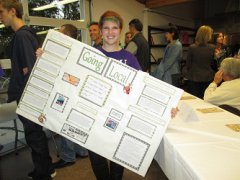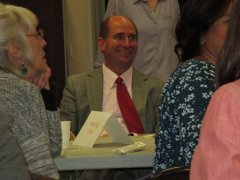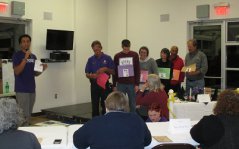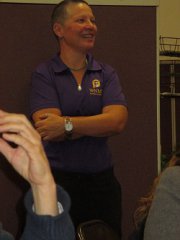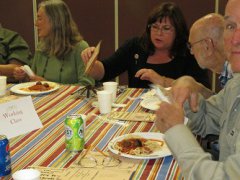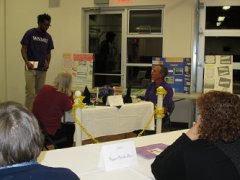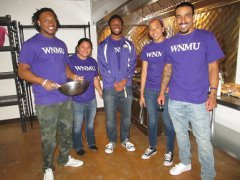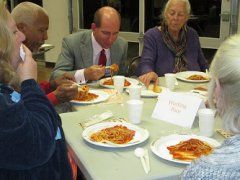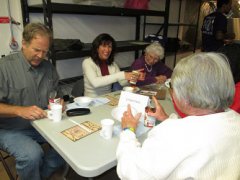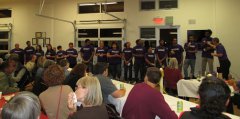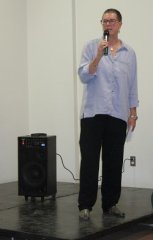Article and Photos by Charlie McKee
Hunger for Knowledge Dinner 2014
Hunger for Knowledge Dinner 2014
Youth volunteers from the Church of Jesus Christ of Latter-Day Saints tend to the garden at The Commons as guests gather for the Dinner.
Hunger for Knowledge Dinner 2014
The table is set for the "Upper Class" diners of the evening, the privileged 1%.
Hunger for Knowledge Dinner 2014
WNMU Environmental Sociology students Adrian Lopez (left) and Jaclyn Harrison (right) explain their respective 4 week projects of eliminating something from their daily lives to effect social change. Harrison eliminated the use of plastic bags, while Adrian minimized driving and organized carpools for WNMU football players to get to practice 4 days/week.
Hunger for Knowledge Dinner 2014
WNMU sophomore Larry Turner, who commutes daily from Lordsburg to attend classes in Silver City, decided to stop his personal use of cases of plastic water bottles each week. He switched to using refillable bottles at the water refill station, thereby stopping 8 cases of plastic bottles going to landfill and saving $30 over a 4 week period.
Hunger for Knowledge Dinner 2014
Emilee Goutcher, who will be graduating from WNMU with a major in Environmental Sustainability in December, chose to "buy local" to effect social change. Goutcher states that "local is better" and is a "plausible lifestyle," having shopped for food only at locally owned businesses over a 4 week period.
Hunger for Knowledge Dinner 2014
In spite of being part of the "Working Poor" class, WNMU President Dr. Joseph Shepard appears to be enjoying the "reality" Monopoly game.
Hunger for Knowledge Dinner 2014
A volunteer representative of each of the "classes" steps up to play live Monopoly, advancing in the game only when correctly answering the MC's questions. The classes were: Upper Class, Upper Middle Class, Lower Middle Class, Working Class, Working Poor, and Under Class.
Hunger for Knowledge Dinner 2014
Dr. Emma Bailey, the WNMU Professor of Sociology who spearheaded the evening's event, is clearly pleased with the students' and guests' performances in the live Monopoly game.
Hunger for Knowledge Dinner 2014
Members of the "Working Class," including Silver City Town Councilor Cynthia Bettison (center), scrutinize the 2 meatballs they received with their spaghetti dinner.
Hunger for Knowledge Dinner 2014
While the diners at the "Upper Middle Class" table look on enviously, the dinner guests at the "Upper Class" (1% of the population) table begin to partake of their haute cuisine.-?`^
Hunger for Knowledge Dinner 2014
The chefs extraordinaires of the evening, preparing the food for each of the "classes," were WNMU Social Inequality students (left to right): Preston Blincoe, Chyler Imai, Willie Bobbitt, Ashley Witherspoon, and Donald Byrd.
Hunger for Knowledge Dinner 2014
The "Working Poor" class discovers that they have no meatballs in their spaghetti dinner, adding salt to the wound of no bread or salad.
Hunger for Knowledge Dinner 2014
The members of the "Under Class" (the 9 to 12% of the population defined as the shadow group that earns money through selling drugs or other illegal means and generally lives on the street) find it difficult to open their few cans of SpaghettiOs with beer can openers.
Hunger for Knowledge Dinner 2014
The WNMU Sociology students tell the dinner guests the "one thing I want you to know" about the experience of the class-segregated Hunger for Knowledge Dinner.
Hunger for Knowledge Dinner 2014
Alicia Edwards, Executive Director of The Volunteer Center, closes the evening's event with thanks for WNMU'S partnership and the students' efforts in raising much needed funds for the Center.
Attendees at the Sixth Annual Hunger for Knowledge Dinner on Wednesday evening, Nov. 5, were given an object lesson in class distinction through their stomachs. It was definitely a case of the "Haves" versus the "Have Nots." In collaboration with Western New Mexico University (WNMU) and with this year's participation of the American Association of University Women (AAUW), the annual event is a fundraiser for The Volunteer Center of Grant County and was held at The Volunteer Center's facility, The Commons.
Students of WNMU's Social Inequality and Environmental Sociology classes designed an experiential evening for the "dinner guests," who were seated at dinner tables by their assigned "social class" (drawn from envelopes by WNMU students for each guest) and who dined throughout the evening on a "spaghetti dinner" appropriate to their class. The spaghetti dinner ranged from the sublime of Fettuccini with Shrimp and Chocolate Mousse for the Upper Class (donated by Shevek & Co. and Diane's Restaurants), to the mediocre of Spaghetti with Meatballs for the Middle and Lower Classes and the harsh of cold, canned SpaghettiOs for the Under Class (donated by AAUW). This reporter was part of the Lower Middle Class, receiving 3 meatballs with her spaghetti as opposed to the 4 meatballs given to the Upper Middle Class, the 2 given to the Working Class, and none given to the Working Poor.
After dinner guests finished touring and viewing the WNMU students' Environmental Sociology project demonstrations and were seated at their appropriate "class" table, Dr. Emma Bailey, WNMU Professor of Sociology and force majeure of the Hunger for Knowledge Dinner concept, explained that the evening's events and cuisine were all the creation of the students themselves. They had worked independently to invent and orchestrate a live "Monopoly" game among representatives of each class, a game in which the rich got richer and the poor went to jail • do not pass "Go," do not collect $100. The students had also taken the class-segregated dinner idea and run with it: creating the menus within the budget allocated; purchasing the food with social consciousness; and subsequently becoming the chefs who prepared the varied feast in The Commons' new commercial kitchen.
Bailey also acknowledged and thanked the AAUW volunteer coaches who helped the student teams bring the evening's experiment in social justice to life: Adrienne Dare, Linda Hoy, and Kelduyn Garland. She then introduced the WNMU students, who each told the dinner guests as they enjoyed their respective desserts (if they were privileged enough to receive dessert) what they wanted the audience to know as a result of this experience.
Alicia Edwards, Executive Director of The Volunteer Center, concluded the evening by announcing that the WNMU students had raised $1,400 for the Center through the Hunger for Knowledge Dinner. She also cited numerous accomplishments of the Center in 2014, including reaching more than 1,000 families per month in Grant County with food distributions. Edwards noted that the success of the fundraiser was "all because of these young people and our partnership with WNMU."
